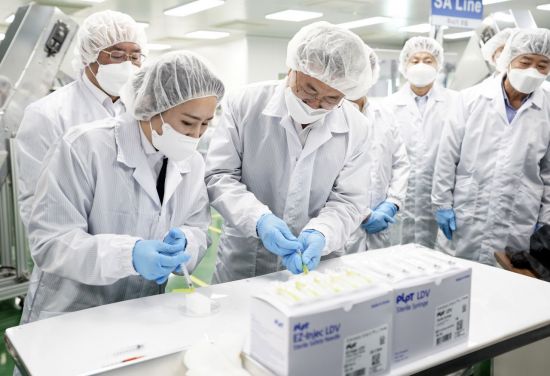Insufficient number of special syringes to minimize residual vaccine
Unlike general syringes, more than 6 doses per bottle can be inoculated
Risk of discarding some vaccines if syringes are insufficient

On the afternoon of the 18th, President Moon Jae-in is demonstrating a comparison between a general syringe and a minimum residual type syringe at Poonglim Pharmatech, a production facility for the least residual type (LDS) syringe for corona 19 vaccination in Gunsan, Jeollabuk-do. / Photo = Yonhap News
[아시아경제 임주형 기자] Some Japanese netizens are pouring out anger as it was confirmed that the Japanese government, which had purchased the Corona 19 vaccine but discarded some of the supplies because it could not secure a special syringe necessary for vaccination, has made a request to purchase a large quantity from a Korean syringe company. There are voices criticizing the Japanese government’s insufficiency, which has been asking for help from a Korean company due to the failure to predict the demand for syringes early. However, some pointed out that taking advantage of this situation, Korea and Japan should establish a friendly relationship.
According to reports in Japanese local media such as’Nihon TV’ on the 18th (local time), the Japanese government recently ordered 80 million syringes from Poonglim Pharmatech, a Korean low dead space special syringe manufacturer. .
This syringe was developed to reduce the remaining vaccine after inoculation, and it features a minimal space between the syringe’s piston and needle. Unlike conventional syringes that can inject 5 times per bottle of vaccine container, LDS syringes can inject more than 6 times per bottle.
Earlier, Japan’s Ministry of Health and Welfare purchased a Corona 19 vaccine from Pfizer, a global pharmaceutical company in the United States in December of last year, and signed a total of 72 million people, calculated on the premise of ‘6 vaccinations per bottle of vaccine’.

Japanese Prime Minister Yoshihide Suga (2nd from the top left) is watching the vaccination of a novel coronavirus infection (Corona 19) at the state-run Tokyo Medical Center in Tokyo on the 18th (local time). Started immunization. / Photo = Yonhap News
The problem is that the Ministry of Health and Welfare did not take measures to introduce special syringes afterwards. This means that even though there is remaining vaccine, there may be situations where the inoculation cannot be performed due to insufficient number of syringes.
In response to this situation, the Japanese government urgently requested a syringe manufacturer to increase production of special syringes afterwards, but received an answer that it was impossible. Nipro, one of the syringe manufacturers, decided to increase production of special syringes, but the actual supply is said to be possible only in September. As a result, we have no choice but to request purchases from companies in other countries such as Korea.
When the news was delivered, Japanese netizens pointed out that they were’disappointed by the government’s easy vaccination plan.’ Critics say that even though there was enough time to increase the production of special syringes before the mass vaccination was conducted, the required amount was not sufficiently predicted.
In an article written on Twitter, a Japanese netizen said, “I bought the vaccine two months ago, but I didn’t know how many syringes I needed during that period,” and “I’m just pathetic.”
Another netizen said, “Because Korea has already expanded production since December of last year, this situation has not occurred. We have only recently realized that it is difficult to increase production of syringes,” he criticized the Japanese government by comparing the two countries.
On the other hand, some voices emphasized the friendly relationship between Korea and Japan.
One netizen said, “If Korea didn’t have the ability to produce syringes, the Japanese government would have been able to quickly acquire syringes,” and pointed out, “This is the reason to get along with neighboring countries that have deep trade relations.”
Reporter Lim Joo-hyung [email protected]
